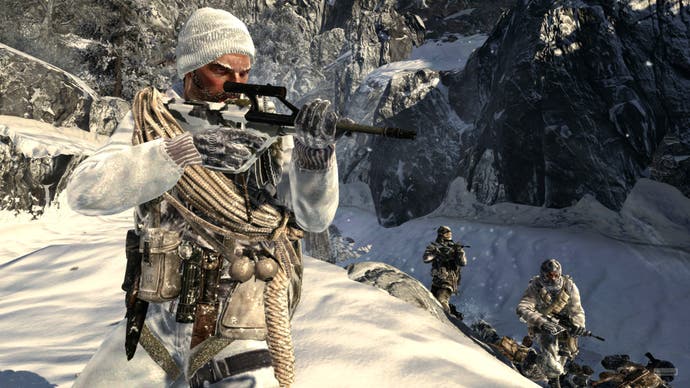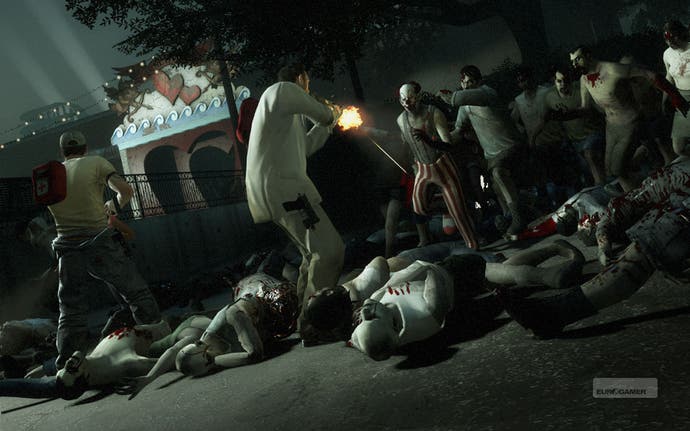Fingers on the pulse
Which games get your heart racing the most?
Like many people, I've been been playing a lot of Black Ops lately. A little too much, perhaps. When you smear yourself in camo paint and start looking for decent camping spots on your way to the bus stop, you know you're overdoing it.
But even though I've enjoyed playing the game, I've noticed is the multiplayer action doesn't set my pulse racing quite so much as Modern Warfare 2 did. I mean this quite literally. A MW2 session would leave my heart pounding, my pupils dilated and my adrenaline levels off the chart. And don't even get me started on the mood swings.
We like to pretend it isn't so, but playing games can really make your blood boil. Whether you're attempting to post a perfect Pac-Man score or getting noob-tubed online by some pre-pubescent Americans, gaming can be a stressful experience.
But just how stressful? What are the psychological and physiological impacts of engaging in our favourite pastime?
The idea
Before you throw your hands up in disgust as yet another article tells you how bad playing games is for your health, let me state that I'm an avid gamer. I love playing them, I love talking about them and I love writing about them.
I'm not about to tut at you for wasting your time playing games, or suggest you're liable to kill your pet tortoise with a potato masher if you put in too many hours with a first-person shooter. I'm interested in why certain games get our pulses racing, and why the physiological effects they generate make them enjoyable and even addictive.
The equipment

Imagine a scene similar to Ivan Drago's training camp in Rocky IV. I'm flanked by scientists in white coats and banks of humming machinery whilst playing some of the gaming world's recent releases.
Or, imagine a lounge, an Xbox 360 and an off-the-shelf heart rate monitor. This isn't meant to be high-level science - it's about investigating why some games set our hearts thumping while others leave them cold.
The games
The weapons of choice for this experiment were blockbuster shooter Black Ops, football behemoth FIFA 11, the super fast arcade street racer Split Second Velocity and zombie thriller Left 4 Dead 2. The aim in picking such a vast array of titles was to find out if different game types had a different impact on my body.
The results
I have a resting heart rate of around 60 bpm. It's about average and would be a lot lower if I spent my time in the gym rather than experimenting with the physiological effects of games, but there you go.
I wanted to find out which game would have the biggest impact on my ticker - whether driving cars would set my pulse racing faster than beating zombies to death with a cricket bat, for example. Here's I found out.
Split/Second: Velocity
Disney's eye-popping racer was the first game I booted up. The impact was immediate. In the heat of a race where high speeds, exploding cars and general hairpin tomfoolery were the norm, there was a 15 per cent increase in my BPM.
Not much to write home about. But as the races got harder my heart pumped faster and faster, consistently clocking up an average increase of between 15 20 per cent. There was even the odd spike, with a couple of 30 per cent-plus rises coinciding with those races where I repeatedly crashed into the barriers and flung my controller across the room.
Left 4 Dead 2

After taking a time out and letting my heart rate drop back down to its usual state, Left 4 Dead 2 proved to be somewhat of a disappointment. Overall the increases were negligible, save for the occasional zombie horde which would cause a spurt in adrenalin levels and a subsequent 15 - 22 per cent peak in my BPM.
It's the type of pattern that you'd expect to find whilst watching your average scary movie, with peaks and troughs revolving around the action on screen.
Call of Duty: Black Ops
Feeling somewhat underwhelmed by the previous two experiments, I hoped Treyarch's smash hit shooter would give me some more interesting results. While playing Split Second and Left 4 Dead 2 I'd learned that violence and tension seemed to have a direct impact on my heart rate. I was optimistic these elements would come together in Black Ops to spectacular effect.
Within moments of getting stuck into the single-player campaign, the numbers started to go off the chart. The monitor began beeping away: 81 BPM, 86 BPM, 91 BPM... The numbers peaked at around 95 BPM - around 50 per cent above my resting heart rate.
They were consistent, too. No matter which game mode I played the figures stayed high, providing the sort of prolonged increase to my heart rate you might experience whilst taking a brisk walk.







